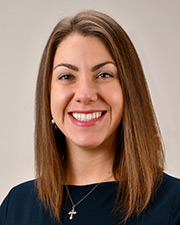Rachel Jantea, MD, MS

Assistant Professor of Medicine
UTHealth Houston McGovern Medical School
Email: Rachel.Jantea@uth.tmc.edu
Phone: (713) 500-3993
Educational Philosophy
I employ an evidence-based, interactive teaching style that reflects my own experiences as a learner and my educator training. I have a Master of Science in Medical Education, and a special interest in interprofessional education and geriatrics education. I engage in direct clinical teaching on the geriatrics inpatient and consult services at Memorial Hermann Hospital. I also designed and direct several geriatric interprofessional education activities for undergraduate health profession students.
As a teacher and mentor, I strive to create a learning environment (both clinical and classroom) that maximizes psychological safety and encourages student engagement and risk-taking. I consciously role model and normalize both personal knowledge gaps and errors in order to 1) encourage learners to attempt problem solving and skill practice in a safe learning space and 2) teach learners to identify limitations in their knowledge or skills to practice lifelong learning and improvement. I also strive to integrate the patient perspective into clinical teaching to help learners build empathy and respect for the real challenges faced in our healthcare system and society.
Acknowledging the importance of active learning, I have an engaging teaching style that includes knowledge probing, collaborative learning and group problem solving, enthusiastic delivery of information, and immediate application and practice of new concepts. My teaching, which draws from both cognitive and constructivist learning theories, typically starts with a problem to be solved (often a recently encountered case that is temporally relevant, drawing on the andragogical principle of problem-centered learning). I invite each learner to share insights on the problem, with each learner building on insights shared by others in the group. This allows them to connect the current problem with prior knowledge and experience and capitalizes on the generation effect (whereby concepts which are self-generated are better retained than information simply “given” to the learner). Then, I teach relevant content, probing knowledge as I go by asking questions before giving the information. This further amplifies the generation effect and allows me to tailor my teaching to a level of desirable difficulty. Finally, I ask learners to recall the new information (practice effect) and/or summarize a take home point in their own words (generation effect).
As a lifelong learner myself, I regularly attend medical education conferences, observe other educators as they teach, and solicit feedback from my learners and peers. In this way, I continuously refine my teaching style by incorporating new methods and applying them in different contexts.
Interests and Expertise
Geriatric Acute Care, Delirium, Dementia, Interprofessional education and practice, Age-Friendly Health Systems, Goals of Care
Curriculum design, simulation-based teaching, educator portfolio to support promotion and professional development, educational research